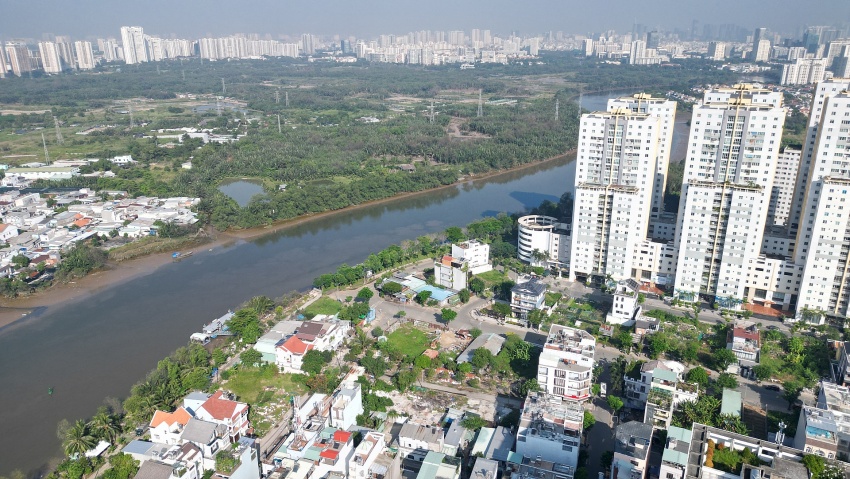Vietnam's real estate market ranked third in region
 |
| Vietnam real estate reaches maturity. Photo: Le Toan |
The country demonstrates strong potential for foreign direct investment (FDI), driven by its strategic location, favourable demographics, and open policies. Supported by solid fundamentals, Vietnam's property market delivered a strong performance in 2024 across offices, ready-built factories and warehouses, and apartments.
Office market
In 2024, Vietnam’s office market surged with net absorption exceeding 160,000 square metres, the highest in five years, fuelled by robust expansions in IT, technology, and finance.
Ho Chi Minh City welcomed over 118,000 sq.m of new supply, primarily in prime District 1 locations such as The Nexus, Riverfront Financial Centre, ThaiSquare The Merit, and e.town 6 in Tan Binh District.
Meanwhile, Hanoi recorded nearly 87,000 sq.m of new space, attracting strong interest during pre-leases thanks to high construction quality and competitive terms.
“2024 was a record year, with many significant contracts successfully completed. In 2025, leasing activities are expected to grow steadily in both Ho Chi Minh City and Hanoi. Buildings will actively enhance their leasing plans, focusing on competitive pricing, better services, and enticing leasing terms to meet tenant needs and ensure sustained demand.” said Leo Nguyen, senior director of occupier strategy and solutions, Knight Frank Vietnam.
Ready-built factories and warehouses
Vietnam’s advantageous location and cost competitiveness have solidified its role as a key “China-Plus-One” destination, especially since the US-China Trade War in 2018.
Over the past six years, Vietnam’s RBF/RBW market has doubled its total supply from 6.6 million sq.m in 2018 to over 15.6 million sq.m in 2024, largely driven by institutional developers such as BW, SLP, Frasers, Cainiao, and KCN Vietnam.
Occupancy rates in both regions averaged above 80 per cent in 2024, buoyed by e-commerce expansion and manufacturing inflows from Chinese and European small- and medium-sized enterprises.
“Demand for ready-built warehouses and factories in 2025 will remain strong, driven by the shift of manufacturing from China and government support for manufacturing and trade to achieve 8 per cent GDP growth,” said Son Hoang, valuation and advisory associate director, Knight Frank Vietnam.
Apartment market
The Hanoi apartment market burgeoned in 2024, with 27,268 new units, representing a three-fold increase in new supply from 2023.
In contrast, tightening credit control on real estate, bond fraud, and legal struggles in 2023-2024 continued to delay new apartment developments in Ho Chi Minh City, with less than 4,900 new units in 2024, down 58 per cent year-over-year.
After hitting its lowest point in 2023, Ho Chi Minh City apartment demand indicated slight signs of recovery with an absorption rate of 63 per cent, equivalent to more than 6,200 sold units.
In contrast to the Ho Chi Minh City market, Hanoi's apartment demand experienced a sharp increase, with a 98 per cent absorption rate, translating into more than 30,700 units sold. This represents three times the sales volume of 2023 and the highest level achieved over the past five years.
In the 2025-2026 period, Ho Chi Minh City is projected to welcome more than 24,000 units, with only 8,600 units in 2025 while the majority dominate in 2026. Meanwhile, Hanoi is expected to have more than 20,000 units each year, mainly from township projects.
“Integrated townships are redefining modern living with an optimal mix of international-quality products and extensive amenities. These townships dominated the market in 2024 and are expected to account for nearly half of the city's future supply over the next 5–7 years,” noted Hoang.
 | Real estate growth anticipated next year The real estate market in Vietnam is poised for a new cycle of growth in 2025, lifted by renewed confidence and revised legislation. |
 | Fresh hopes for real estate in 2025 Next year is anticipated to mark the beginning of a new development cycle for Vietnam’s real estate market, with expectations of continued recovery and growth, particularly in major cities like Hanoi and Ho Chi Minh City. |
 | Real estate market will be vibrant and competitive The prospects for Vietnam’s real estate market segments in 2025 have upsides and downsides. The industrial real estate market segment will have good growth due to strong foreign investment, strong infrastructural development, and the new economic development cycle leading to increasing production. |
What the stars mean:
★ Poor ★ ★ Promising ★★★ Good ★★★★ Very good ★★★★★ Exceptional
Related Contents
Latest News
More News
- An Phat 5 Industrial Park targets ESG-driven investors in Hai Phong (January 26, 2026 | 08:30)
- Decree opens incentives for green urban development (January 24, 2026 | 11:18)
- Public investment is reshaping real estate’s role in Vietnam (January 21, 2026 | 10:04)
- Ho Chi Minh City seeks investor to revive Binh Quoi–Thanh Da project (January 19, 2026 | 11:58)
- Sun Group launches construction of Rach Chiec sports complex (January 16, 2026 | 16:17)
- CEO Group breaks ground on first industrial park in Haiphong Free Trade Zone (January 15, 2026 | 15:47)
- BRIGHTPARK Entertainment Complex opens in Ninh Binh (January 12, 2026 | 14:27)
- Ho Chi Minh City's industrial parks top $5.3 billion investment in 2025 (January 06, 2026 | 08:38)
- Why Vietnam must build a global strategy for its construction industry (December 31, 2025 | 18:57)
- Housing operations must be effective (December 29, 2025 | 10:00)

 Tag:
Tag:
















 Mobile Version
Mobile Version